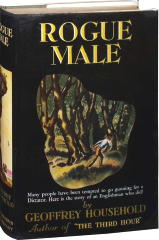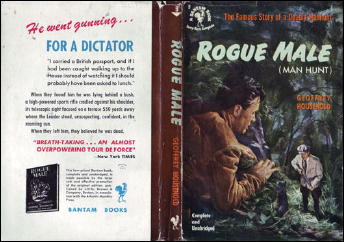Tue 29 Sep 2009
A 1001 MIDNIGHTS review: GEOFFREY HOUSEHOLD – Rogue Male.
Posted by Steve under 1001 Midnights , Reviews[5] Comments
by Bill Pronzini:
GEOFFREY HOUSEHOLD – Rogue Male. Little Brown, hardcover, 1939. UK edition: Chatto & Windus, hc, 1939. Also published as Man Hunt: Triangle, US, hc, 1943. Reprinted many times in both hardcover and soft, including Bantam #9, 1946, w/dust jacket (shown); Pyramid R930, 1963.
Film: TCF, 1942, as Man Hunt (with Walter Pidgeon, George Sanders, Joan Bennett; reviewed here by David L. Vineyard.

Rogue Male caused quite a stir in both England and the United States when it was first published. It is the story of one man’s private war with Hitler and the Gestapo, although neither is mentioned by name.
But it is much more than that, else its popularity would not have survived the war years: It has been almost constantly in print over the past five decades. The Saturday Review of Literature said, “You are not likely to find a better adventure story.” And the New York Times called it “an overpowering tour de force … spare, tense, desperately alive.” Those superlatives still apply today.
The novel is told in the form of a first-person journal whose author is never identified. We know only that he is a famous and well-to-do British sportsman whose name is widely known and who has been “frequently and unavoidably dishonored by the banners and praises of the penny press.”
In the days before full-scale war in Europe, this man set out alone on a hunting trip in Poland, and it occurred to him there that it might be his greatest challenge to stalk a different kind of game for a change — human game.
Not to kill, of course; he is not a psychopath. He wants only to get close enough to a certain heavily guarded dictator to place the man in the cross hairs of his rifle’s telescopic sight.
And this he does, being a superb and wily outdoorsman: He comes within a finger pressure of ridding Europe of its greatest tyrant. But he doesn’t fire; and because he doesn’t, he is caught and brutally tortured.
He tells his captors the truth, but they don’t believe him. And even if they do, it doesn’t matter; he must be killed to prevent the truth from leaking out and others trying the same thing.
They put him over a cliff to make his death took like an accident. Only he doesn’t die; he survives the fall. And even though he is more animal than man at first, unable to use his hands (they have been mangled by his tormentors) and with his left eye a bloody horror, he still manages to make his arduous way to a seaport and stowaway on board a ship bound for England.
Once he arrives, however, his ordeal hasn’t ended; it has only just begun.

He knows that agents of the tyrant will be sent after him, knows that his only hope of survival is to disappear completely and without a trace. He makes financial arrangements with the solicitor in charge of his estate, then leaves London.
But at the Aldwych train station he is accosted by an enemy agent and has no choice but to kill the man. As a result, he becomes a fugitive from the British police as well. He flees to a remote part of Dorset, covering his tracks as he travels, and quite literally goes to ground: He digs out an undetectable burrow inside an isolated hedgerow.
You might think he is safe then; so did he. But he isn’t. He makes one mistake that leads the enemy agents and the police to his vicinity and forces him to live like a mole inside his burrow for days on end. And when he emerges, it is to kill again, and to vow to return to the tyrant’s country and once more put the man in the cross hairs of his rifle, and this time to pull the trigger.
This is a nightmarish novel, filled with breathless chases, fascinating detail-work, and images that will haunt you for days after reading. If you like chase/adventure stories and you haven’t yet read Rogue Male, do yourself a favor. You won’t be disappointed.
———
Reprinted with permission from 1001 Midnights, edited by Bill Pronzini & Marcia Muller and published by The Battered Silicon Dispatch Box, 2007. Copyright © 1986, 2007 by the Pronzini-Muller Family Trust.
September 29th, 2009 at 4:36 pm
Household was less than terrific with some of the staples of fiction writing: plot, characterization, dialogue, things like that. But at his best he could evoke an almost metaphysical relationship between hunter and hunted that I always found compelling.
September 29th, 2009 at 5:30 pm
One of my husband’s favorites. Can I link to this on Friday?
September 29th, 2009 at 5:38 pm
I’m not sure Household cared about those things all that much. His favorite type of book was the picaresque, and he wrote several including Fellow Passenger and The Life and Times of Bernardo Brown. His short story “Taboo” is considered a classic horror story on the subject of lycanthropy, and his novel The Sending was chosen one of the 100 best fantasy novels — not bad for a writer then close to his eighties.
His first book, The Third Hour, was compared to Stevenson and Conrad. Other than Rogue Male I would rate The High Place, A Rough Shoot, A Time to Die, Olura, Watcher in the Shadows, The Courtesy of Death, Dance of the Dwarfs, Fellow Passenger, The Life and Times of Bernardo Brown, Rogue Justice, and The Sending as among the best thrillers ever written, and honestly can’t say I ever read a bad book or story by the man.
Truthfully there was usually only one character in a Household novel, the narrator, though the heroine of Olura is haunting, and Quive-Smith in Rogue Male is well drawn as is the hero Roger Taine in Rough Shoot and his questionable ally.
But I will agree with Dan that no one ever wrote about the chase quite like Household. there is a haunting quality to his best work that is mindful of Stevenson or Buchan and quite unlike any other writer today. Even his lesser books like The Three Sentinels are worth reading. And if you have never read his collected short stories you owe yourself the treat.
September 29th, 2009 at 5:51 pm
Patti
By all means!
Dan and David
Coming up soon, another Household review from 1001M, the next one WATCHER IN THE SHADOWS.
— Steve
October 2nd, 2009 at 12:17 pm
I personally thought “Watcher in the Shadows” was better than “Rogue Male” – but it’s a close call. And I didn’t realize that Household wrote “Taboo”, though thinking about it now, it clearly bears his imprint. A terrific and unusual story.